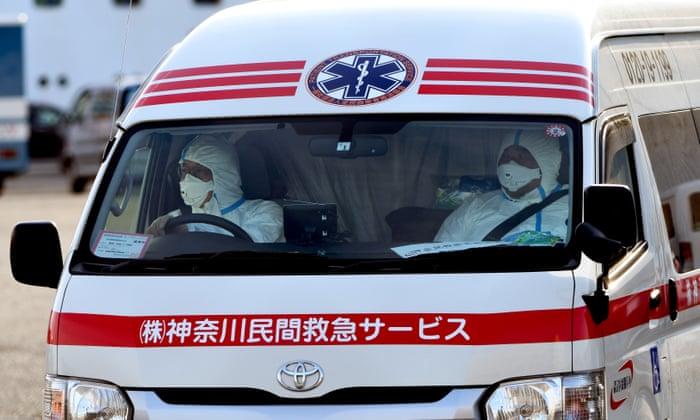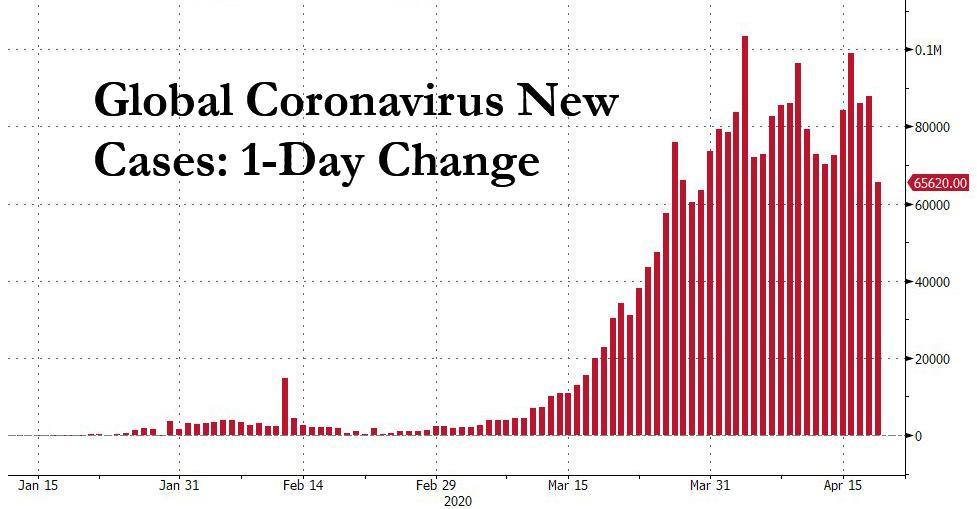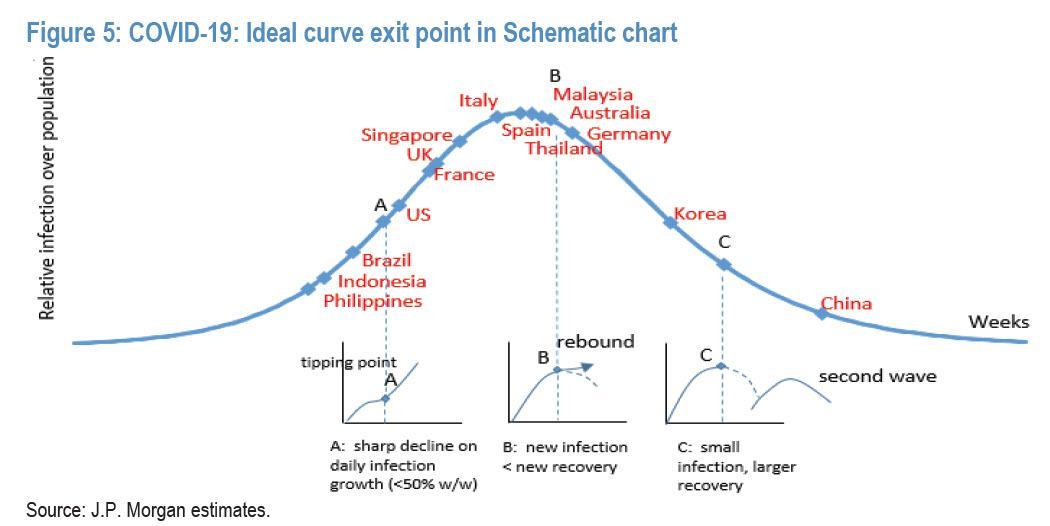Tokyo Hospitals Turn Away Patients As 1/5th Of World Takes First Steps Toward Reopening Economies: Live Updates
Summary:
- Japanese hospitals turn away non-COVID-19 patients
- Russia outbreak continues to accelerate
- Demonstrators demand economies reopen now in Denver, Austin
- South Korea reports clusters as reopening continues
- 1/5th of world is taking first steps toward reopening economies
- “Corona curve” shows outbreak “over the hump”
- UK business furlough scheme flooded with applications
- French foreign minister slams China over propaganda
- German newspaper slams Beijing for “exporting” virus
* * *
Across America, hundreds of protesters showed up to State Capitol buildings in Denver, Austin and elsewhere on Sunday to demand that governors lift their ‘stay-at-home’ orders immediately.
The protests quickly became a flashpoint for confrontation as a few nurses in Denver stepped out to quietly confront the “Covidiots” demanding an immediate reopening. The scene quickly attracted the attention of the MSM as it offered yet another opportunity to promote their narrative of the brave ‘health-care heroes’ – multicultural paragons of not just health care, but every progressive cause under the sun (at least according to the narrative) – confronting the idiotic, ignorant, Trump-supporting ‘covidiots’.
This video gives more of a flavor of what it was like for those nurses:
“If you want communism, go to China” yells this at the nurse.
Incredible discipline by the nurse, who doesn’t respond. https://t.co/dusVa2UWqu— Don Moynihan (@donmoyn) April 20, 2020
Keep in mind: We’re not defending the covidiots, or explicitly condemning them. Denial is one of the most predictable of human responses, and terrified people sometimes do ridiculous shit when the chips are down. That’s human nature, and while they certainly shouldn’t be celebrated or catered to (as President Trump has been doing, to his obvious political detriment) decrying them as monsters also doesn’t help.
Meanwhile, health-care workers who are risking their lives to treat infected patients are done a disservice when they’re asked to take these risks without enough protective equipment, or with other handicaps. These are tremendous sacrifices; that they are putting themselves at risk to safeguard the public health has never been in doubt, and many nurses and doctors around the world have paid the ultimate price during this outbreak. This crisis has witnessed a new spate of ‘health-care martyrs’ celebrated around the world, and especially in China.
Moreover, while a majority of Americans are reportedly fearful of reopening the economy too quickly – according to one recent poll that has been noted repeatedly on “Squawk Box” this morning – if steps aren’t taken soon, we could risk upsetting the very social fabric upon which order depends.
While the outbreak is a crisis that demands to be taken seriously, the potential consequences of a total economic collapse – incidences of severe food shortages, riots, uprisings and looting on top of an unprecedented public-health crisis involving a virus that, in some patients, produces almost unbelievably brutal symptoms – would make things many, many times worse.
Yet, to be sure, the consequences of rushing to reopen could also be disastrous, as Morgan Stanley explains.
In reality, the crowds of these ‘reopen now’ protesters have been modest. Ignoring them might be a better strategy if the goal is getting them to go back inside.
But we digress…
As far as we could tell, the big news overnight is the continued resurgence of the virus in Asia, a phenomenon that hasn’t received nearly enough attention in the mainstream press. Japan, Russia and Singapore are quickly emerging as hotspots, while China is also suffering more outbreaks and clusters than Beijing is letting on.
In Japan, PM Shinzo Abe extended a state of emergency order to cover the entire country as the number of confirmed coronavirus cases soars, indicating that the virus has likely already deeply penetrated Japanese society, many Japanese are simply ignoring the social distancing recommendations. The Japanese constitution treats individual liberty as paramount, so the government can’t actually order businesses to close. Unfortunately, this has meant that many have stayed open, and crowds of people in restaurants and in public remain a not-uncommon site.
Now, as Japan Times explains, hospitals in Tokyo are being overwhelmed with surging coronavirus patients. Some hospitals have even been forced to turn patients away, echoing the horrifying early days of the outbreak in Wuhan.
Except, in an interesting twist, the patients who are being turned away are people suffering from heart attacks, serious accidents and other health problems as hospitals focus all their resources on COVID-19 patients.
Hospitals in Japan are increasingly turning away sick people as the country struggles with surging coronavirus infections and its emergency medical system collapses. In one recent case, an ambulance carrying a man with a fever and difficulty breathing was rejected by 80 hospitals and forced to search for hours for a hospital in downtown Tokyo that would treat him. Another feverish man finally reached a hospital after paramedics unsuccessfully contacted 40 clinics.
In one recent case, an ambulance carrying a man with a fever and difficulty breathing was rejected by 80 hospitals and forced to search for hours for a hospital in downtown Tokyo that would treat him. Another feverish man finally reached a hospital after paramedics unsuccessfully contacted 40 clinics.
Russia is essentially in the same boat as Japan. During the early days of the outbreak, Russian President Vladimir Putin instituted sweeping measures to try and keep the virus out by closing Russia’s border with China and North Korea over the objections of the international community. However, Russia’s hesitation in implementing a countrywide lockdown – it didn’t impose one until late last month – has seemingly cost it these early gains, and Putin is now warning that the country is likely on the precipice of an enormous crisis.
Even South Korea has reported clusters of outbreaks as it has reopened its economy.
A man in Busan now confirmed with COVID19, voted in the election and went to an Easter service while having symptoms. Church is closed for 2 weeks. His daughter, a nurse, is also infected. The hospital she works in is now under cohort quarantine. 296 others have been isolated.
— Laura Bicker (@BBCLBicker) April 20, 2020
On Sunday, Russia reported the 8th day of record numbers of new cases, as rapidly-expanding testing capacity reveals just how widespread the virus has already become. Sweden – which just added “obesity” to its list of high-risk coronavirus preconditions (sorry, Jameela Jamil) – has seen a jump in cases and deaths, even as the government insists that cases are already beginning to plateau, even as gyms, restaurants and businesses have remained open.
The drawback, as President Trump intimated last week, has been a recent runup in cases and deaths, but the country has avoided an out-of-control outbreak while leaving businesses open.
For better or worse, countries are moving ahead with their reopening efforts. By our country, roughly one-fifth of the world’s population – India, Ghana, Iran, Italy, Austria, Germany etc – is taking the first tentative steps toward reopening their economies.
In addition to Italy and Austria, which have started the process of reopening, India, Ghana – the first country in Sub-Saharan Africa to start reopening – announced on Monday their plans to start opening their economies. Iran has also been forced to start reopening again.
In some places, reopening isn’t the craziest idea. As we noted last night, after weeks of “climbing the coronacurve”, we finally have some good news – we are now officially over the “tipping point,” as the global rate of infection growth has slowed from 90% W/W to just 38% W/W in the last fortnight (total infections: 2,157,108, deaths: 143,844, 6.7% mortality rate), and the number of global new daily cases has dropped to 65.6K, the lowest since the end of March.
Here’s what the curve looks like now:
Meanwhile, in the UK, HMG’s worker-furlough scheme – whereby companies are given money for payroll to keep workers on and not fire them – has received more than 70k applications in the first half hour of eligibility as businesses scramble to get cash to pay workers whom they are keeping on the payroll. Businesses will lose access to the money if they don’t keep workers employed.
Back in the US, most of the biggest coronavirus-related stories overnight involved corporations and nonprofits facing pressure to return bailout money. Shake Shack won plaudits for giving back a $10 million (that’s million with an ‘m’) ‘PPP’ loan, however, Ivy League universities including Harvard and Columbia are facing pressure to return millions of dollars that these institutions – which have tens of billions of dollars in their endowments – have accepted from the program, exposing what is perhaps its biggest flaw: The businesses who need the money the most probably aren’t the ones who are getting it first.
Before we go, we’d like to note that the international pressure on China intensified overnight, as French foreign minister Jean-Yves Le Drian sharply criticized Beijing over a propaganda campaign Le Drian said appeared to be intended to “deepen divisions” in the EU. Additionally, as we noted last night, Germany’s largest newspaper accused Beijing of “exporting” the virus, provoking an outraged response from the CPC.
Tyler Durden
Mon, 04/20/2020 – 07:24
via ZeroHedge News https://ift.tt/2xMylO3 Tyler Durden


